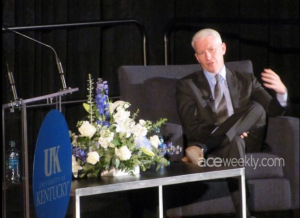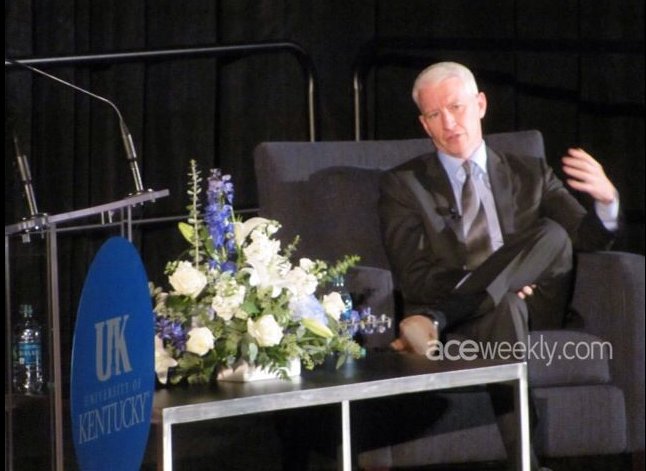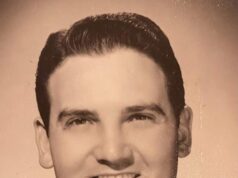

In purely Q&A format, with School of Journalism and Telecommunications Director Dr. Beth Barnes as moderator, Cooper took up topics ranging from the reasons that journalists like him must find and report uncomfortable stories to his own development as a reporter, to a mid-sentence comment on the “Big Ass Fan” circling above the Memorial Coliseum crowd.
He talked about covering stories that he is well-known for, ranging from the Newtown, Conn. school slayings to the Gulf Coast and New Orleans in Hurricane Katrina to spending a month in Port Au Prince, Haiti after the devastating earthquake there.
Cooper talked about particular families — lost to floodwaters or Rwandan genocide — and said that in reporting some of the world’s most intense and sometimes horrific stories, it is important to remember people, not as bodies or statistics, but as people.
“In the end, what lets me sleep at night is that I think there is value about knowing about other people’s struggles.”
Cooper got applause when he talked about his approach to interviewing people who had suffered, like the parents in the Newtown shooting, great loss. “My advice is to just be a human being and never ask that question “How do you feel?” If you don’t know how they feel, you have no business talking to them,” he said.
He related to the crowd how personal experience with loss had shaped his entry into journalism and still shapes his approach. The early in life loss of his father, who succumbed to a heart ailment at 50 and the highly publicized suicide of his brother, who fell from the family’s apartment balcony in front of their mother, the renowned designer and socialite Gloria Vanderbilt, had a young Anderson Cooper considering how people are shaped by and cope with loss.
Just graduated with a political science degree from Yale and “no skill,” Cooper said, he headed into some of the world’s most dangerous spots with a borrowed video camera, covering human loss throughout Rwanda, Somalia, Burma and elsewhere, stumbling onto stories, selling them freelance and luckily, he said, not getting killed.
Cooper, in his comments about the stories he has covered, spoke with great reverence about respecting sources. “The most important thing you can do in an interview is listen,” he said.
But the anchor showed a light-hearted side as well. In sitting down in his chair, he slid up and down and joked that he usually seems much taller but that the chair is so comfy and cushy. In response to a question about favorite celebrity stories, he did a perfect imitation of the singer Adele’s British accent, saying she told him “It’s like a vagina in me throat!” — and then switched to his own voice to quip “Not that I have any experience with that.”
He did address in a nearly final question, a question about the recent letter in Andrew Sullivan’s column in “The Daily Beast” in which he affirmed publicly that he is and has always been, gay. “I thought I had already come out,” Cooper said, of telling his friends and family in 1985, while in high school and never hiding the fact at jobs he had. “I didn’t think I needed to have a press conference.”
He made the decision to publish the letter he said, because it began to appear as if he was hiding something, and he wanted to be direct with people. He did say that he had kept his sexuality to himself also for practical reasons in his job. He recalled spending four days in Iran, three of them arrested. “They hang gay people in Iran,” he said, saying that certainly came to mind.
Cooper combines the large-scale with the everyday. After spending the weekend in Sao Paulo, Brazil looking into a story he is interested in, Cooper said, he did not, as he had planned, fly to Atlanta then on to Lexington for his Monday talk. He was so afraid that someone would tell him what had happened on the “Breaking Bad” finale that he took a flight to New York, went to his house, watched the final episode and then headed to Lexington, he said. Not going to risk the pilot on the Atlanta to Lexington leg giving a spoiler from the cabin.
The talk was given on something rare for Anderson Cooper: a vacation day. That’s also part of his philosophy. “Never underestimate the power of outhustling everyone else around you,” he told the asembled students and faculty.
He had just two hours until the federal government would shut down for the first time in nearly 20 years.









